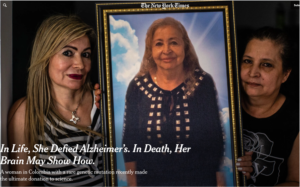Dr. Yakeel T. Quiroz and colleagues have been studying a large, extended family in Colombia, South America, many of whom have a rare mutation in a specific gene (Presenilin-1) that causes early-onset Alzheimer’s disease. Over 1,000 people in this family have this mutation, and almost always develop dementia in their 40s. Dr. Quiroz’s group recently discovered one individual — a woman in her 70s with this genetic mutation — who is only now starting to show symptoms of dementia. She has an even rarer mutation (1 in about 200,000 worldwide) in another gene (APOE3 Christchurch) that may have protected her against dementia.
This extraordinary case offers a truly unique opportunity to understand resistance to Alzheimer’s, and is opening up completely new avenues for Alzheimer’s research and treatment. To capitalize on this discovery, we are establishing a new line of research to study APOE3 Christchurch mutation and other rare mutations that may explain resistance to dementia. By better understanding how this very small group of people in Colombia may have been protected from dementia for decades, we hope to develop better ways to prevent and treat Alzheimer’s around the world.
If you are interested in seeing media coverage about the Alzheimer’s resistance article, click here.








